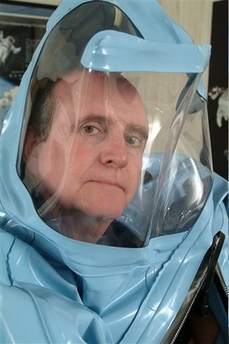US labs mishandling deadly germs
Updated: 2007-10-02 17:08
WASHINGTON - American laboratories handling the world's deadliest germs and toxins have experienced more than 100 accidents and missing shipments since 2003, and the number is increasing steadily as more labs across the country are approved to do the work.
 ILC Dover technician William Ayrey is seen in a self-contained biosuit in Frederica, Del., Monday Oct. 1, 2007. [Agencies] |
No one died, and regulators said the public was never at risk during these incidents. But the documented cases reflect poorly on procedures and oversight at high-security labs, some of which work with organisms and poisons so dangerous that illnesses they cause have no cure. In some cases, labs have failed to report accidents as required by law.
The mishaps include workers bitten or scratched by infected animals, skin cuts, needle sticks and more, according to a review by The Associated Press of confidential reports submitted to federal regulators. They describe accidents involving anthrax, bird flu virus, monkeypox and plague-causing bacteria at 44 labs in 24 states. More than two-dozen incidents were still under investigation.
The number of accidents has risen steadily. Through August, the most recent period covered in the reports obtained by the AP, labs reported 36 accidents and lost shipments during 2007 - nearly double the number reported during all of 2004.
Research labs have worked for years to find cures and treatments for diseases. However, the expansion of the lab network has been dramatic since President Bush announced an upgrade of the nation's bio-warfare defense program five years ago. The National Institute of Allergy and Infectious Diseases, which funds much of the lab research and construction, was spending spent about $41 million on bio-defense labs in 2001. By last year, the spending had risen to $1.6 billion.
The number of labs approved by the government to handle the deadliest substances has nearly doubled to 409 since 2004. Labs are routinely inspected by federal regulators just once every three years, but accidents trigger interim inspections.
"It may be only a matter of time before our nation has a public health incident with potentially catastrophic results," said Rep. Bart Stupak, D-Mich., chairman of the House Energy and Commerce investigations subcommittee. Stupak's panel has been investigating the lab incidents and will conduct a hearing Thursday.
Lab accidents have affected the outside world: Britain's health and safety agency concluded there was a "strong probability" a leaking pipe at a British lab manufacturing vaccines for foot-and-mouth disease was the source of an outbreak of the illness in livestock earlier this year. Britain was forced to suspend exports of livestock, meat and milk products and destroy livestock. The disease does not infect humans.
Accidents aren't the only concern. While medical experts consider it unlikely that a lab employee will become sick and infect others, these labs have strict rules to prevent anyone from stealing organisms or toxins and using them for bioterrorism.
The reports were so sensitive the Bush administration refused to release them under the Freedom of Information Act, citing an anti-bioterrorism law aimed at preventing terrorists from locating stockpiles of poisons and learning who handles them.
|
|
|
||
|
||
|
|
|
|